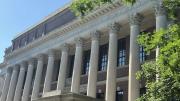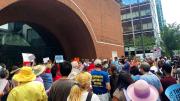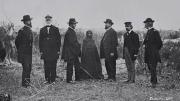In late June, Judge Douglas P. Woodlock of the U.S. District Court in Boston issued a summary judgment clearing Harvard University of three counts of fraud in connection with a program designed to introduce market reforms into the Russian economy during the mid 1990s. The program, administered by the now-defunct Harvard Institute for International Development (HIID) and funded by the U.S. Agency for International Development (USAID), shut down in 1997 once it became known that two Harvard affiliatesprogram director Jonathan R. Hay, J.D. '92, and Jones professor of economics Andrei Shleifer '82 (Hay was based in Moscow, Shleifer in Cambridge)had invested in Russian enterprises through their wives (see "Brevia," September-October 2002, page 73). Because the HIID project was implementing reforms that could have affected those investments, the government alleged that they represented a potential conflict of interest, in violation of contractual provisions.
The U.S. government took legal action against both men and the University more than three years ago, seeking restitution of $34 million in USAID funding that had been paid out (on a $57-million contract) and also seeking punitive damages, possibly as high as triple the liability (or $102 million), under a provision of the False Claims Act that punishes those who defraud the federal government. Judge Woodlock found that Harvard did violate the USAID contract by certifying that the Russian program was fulfilling contractual requirements even while the two men were making the investments. But the court cleared the University of knowingly defrauding the government, and hence of liability for treble damages. Woodlock wrote that "...it is unreasonable to expect that, from rumor-like allegations of impropriety and favoritism, Harvard could have known or recklessly disregarded the fact that it was submitting claims that were false...."
The judge did find Shleifer liable on one of five charges: that of conspiracy to help Hay commit fraud. He found Hay liable for two counts of fraud and one of conspiracy. Woodlock determined that the men were not acting within the scope of their employment by Harvard University, but were making individual investments for individual benefit. Hay's liability under the False Claims Act rests on his failure to disclose personal interests in Russian companies. Shleifer argued that he was exempt from conflict-of-interest rules because he was not actually employed by the Russian project, but only a consultant. The court rejected that claim. However, Woodlock asserted that he did not have enough evidence to determine whether Shleifer was actually assigned to the project country (i.e., Russia), one of the requirements needed to define a conflict of interest. Hay and Shleifer may file appeals, and future proceedings will determine what, if any, damages are due the government from the three defendants, including Harvard.





